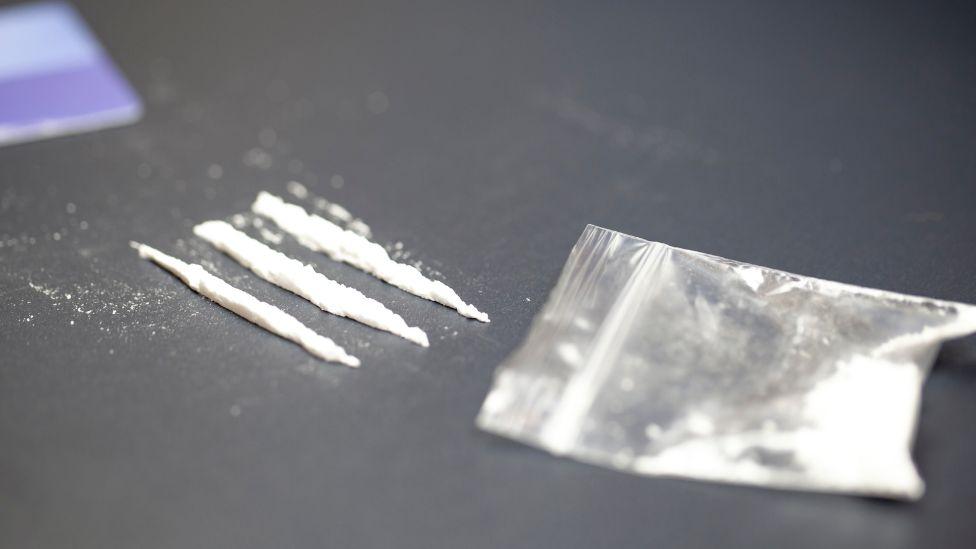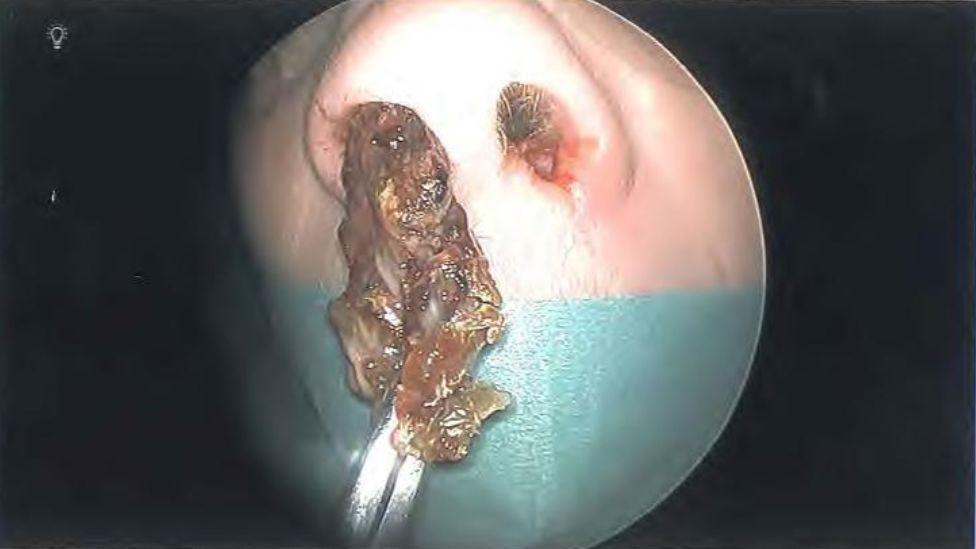Patients face losing noses due to cocaine use, medics warn
- Published

Doctors have warned cocaine is often mixed with other harmful substances
A rising number of people are suffering irreparable damage to their noses due to cocaine use, doctors have warned.
Patients have been told they could lose their noses entirely after snorting drugs cut with products such as de-worming medicine used by vets.
NHS Lanarkshire said the number of people being treated by ear, nose and throat medics due to cocaine use has tripled in recent years.
Staff at University Hospital Monklands are now hoping to raise awareness.
Warning: This article contains a graphic image.
Ear, nose and throat (ENT) consultant Nicholas Calder, who specialises in nasal reconstructive surgery at the hospital, said: "The number of patients we are treating is increasing year on year and patients come to us from a cross section of the population."
Cocaine's effects have been publicised previously by former EastEnders actress Danniella Westbrook, who was left with a hole in her nose.
Fraser, using only his first name, spoke about suffering severe damage to his nasal septum after repeatedly snorting the drug.
After his nose started to collapse, he said he stopped going out and isolated himself. Only when the Covid pandemic hit, and masks became compulsory in public places, did he feel able to face the outside world.
Fraser was told by his GP that his nose may have to be removed and replaced by a prosthetic structure.

Fraser's nose required reconstructive surgery due to cocaine use
That option was averted following successful reconstructive surgery by Natarajan Balaji, an ENT consultant at University Hospital Monklands and the current president of the British Society of Facial Plastic Surgery.
Fraser, who may require further surgery in the future, said: "Having been told I would lose my nose and to then be told they would be able to rebuild it was incredible.
"However, I am one of the lucky ones as I started taking cocaine for fun and it was a part of my life for a long time.
"I am not ashamed of that but I do want other people to think of the damage that snorting cocaine can do to not just their nose but their body."
He added: "I am extremely lucky and have changed my life but my story could have been very different and I could be going to bed at night removing my prosthetic nose."
Mr Balaji warned the drug is often laced with other harmful substances.
"Cocaine is cut with other ingredients including Levamisole, which is used in de-worming tablets for dogs and cats, and Phenacetin, an analgesic and fever-reducing drug used in veterinary medicine," he said.
"Cocaine also has certain types of acids mixed with the ingredients.
"When snorted, cocaine causes the blood vessels to contract very strongly, and the nasal septum is very sensitive to reduced blood flow. After using cocaine a few times, the nasal structure can begin to die, causing perforations."
Increased cocaine use
The latest statistics on drug deaths, external in Scotland show cocaine was implicated in 403 (30%) of the cases in 2021.
The number of people presenting for initial assessment at specialist drug treatment services who report cocaine as their main drug has also increased sharply in recent years, external.
In 2020/21 the figure was 18%, following a peak of 21% in 2019/20. Between 2006/07 and 2015/16, the figure was between 5% and 8%.
David Liddell, CEO of the Scottish Drugs Forum, told BBC Scotland that cocaine use has become much more common among individuals with a long-term drug problem in the past seven to eight years.
He added: "Cocaine use is increasing in the wider population; however, the extent of this increase and the associated harms remain largely hidden, with limited data available.
"It is evident that people who primarily use cocaine are unlikely to seek help from services until their issues are severe. This is due to a number of factors including the stigma attached to drug use."
Related topics
- Published13 June 2018

- Published23 February 2023
